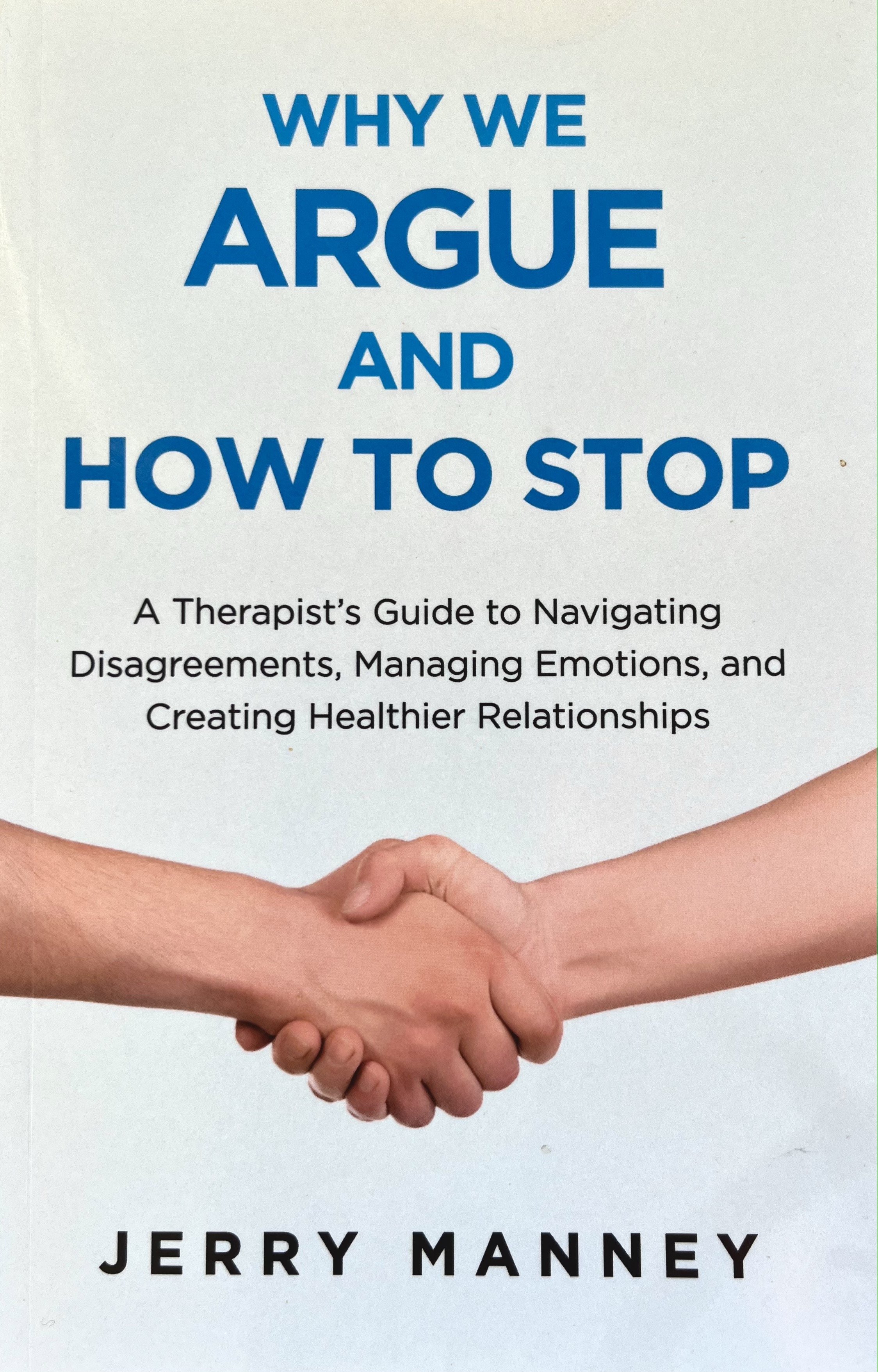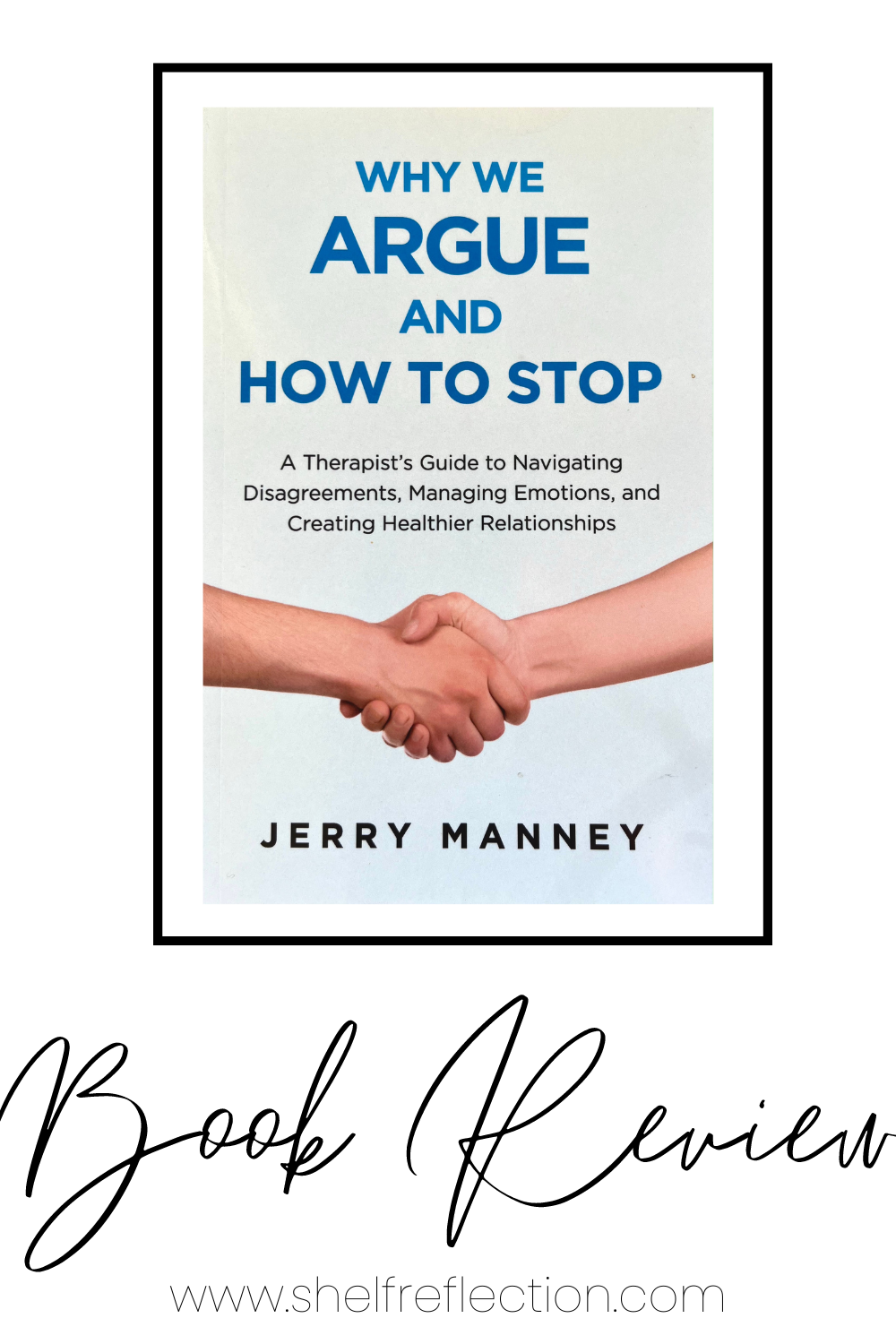Why We Argue and How to Stop
Why We Argue and How to Stop: A Therapist’s Guide to Navigating Disagreements, Managing Emotions, and Creating Healthier Relationships
By: Jerry Manney
"Practice makes progress.”
"Try different, not harder.”
If you’re like me and you never argue, I guess you don’t need this book…
And if you’re also like me, then it’s hard to admit that you argue too much.
So maybe it wouldn’t be a bad idea to see what we could do better at.
As they term it, consider this book AFGE: Another Freakin’ Growth Experience!
Last year I read Kim and Penn Holderness’s book Everybody Fights: So Why Not Get Better At It. I recommend it. It’s more casual and humorous than this one but still has some good ideas in it.
Why We Argue and How to Stop, on the other hand, is written by a therapist so it has a more serious tone. Nonetheless, his advice is worth taking and I recommend his book as well.
I see a counselor every month or so and found Manney’s content to be similar in what I work on with my therapist. We can only control what we think and say. We can’t control other people’s thoughts and words so we need to be evaluating our own unhealthy thought patterns and what scenarios create intense emotional reactions in which we ‘invite others to argue.’
One main aspect of this book is Manney’s encouragement to readers to keep a journal to write down their thoughts. I think this is a great way to process the material and be able to apply it to your regular life. Some things may be hard to come up with off the top of your head, but when conflict comes up, it will help to write down what was said, what happened, and what you were feeling. Then you can think through some of his suggestions and see which ones apply to that situation.
Writing helps your mind stay focused and I believe will help you get more out of this book than just reading it cover to cover.
Maybe you’re hesitant to read a book by a therapist. Maybe it seems pointless or doesn’t seem like anything will help you. Well, I challenge you to read it.
No book like this is perfectly tailored to your situation, but even if you take away ONE helpful communication device to make all the conflict we encounter with friends, family, and coworkers easier to navigate, isn’t that worth it?
And I would venture to guess… you’ll probably get more than one.
Favorite Quotes and Take Aways:
“An apology followed by a ‘but’ is not a true apology, but rather a justification for your actions.”
My apologies have more buts than a SirMixalot song. I can see how removing these from my apologies will keep arguments from prolonging and turning more heated. Apologies need to stay apologies with no disclaimers. Then, post-apology, there are ways to talk about other things at play.“Don’t assume to know what they’re thinking— ask them.”
”Projecting your own thoughts and emotions onto someone else’s motives often fuels increasingly strong internal reactions.”
This has been a big talking point with my counselor. She uses the phrase ‘What’s the story you’re telling yourself?’ So many of my arguments with my husband result from what I think he’s thinking or feeling. He may make a comment like ‘Does your chicken alfredo usually look like this?’ And I think in my head, ‘I finally make supper and he hates it. He thinks I did a bad job making it and wishes I would have made something different and wishes I would make supper more often. I’m a failure of a wife and a mother.’
See how that spirals? My response to him is defensive when all he meant by his comment was ‘Hey, this looks different, right? Okay, cool, I’m gonna eat it now.’
Instead of projecting my own thoughts and feelings on others and assuming I know them, I need to ask them and to question my thinking and figure out what stories I’m telling myself— are they fair and accurate? Can I ask clarifying questions to better understand what the other person is thinking?“Consider that one person isn’t necessarily right and the other wrong.”
My world is largely black and white. Right and wrong usually seem obvious to me. So, yes, this causes conflict. It seems like a simple concept but hard to execute. You mean two people can say or feel two different things and BOTH be right?! It definitely helps arguments when both parties consider the rightness of what the other person is saying.“Resentment means to ‘feel again.’ You refeel the original pain.”
I’ve never really thought about what resentment literally means. But when you see it written this way it seems rather counterproductive to spend your life resenting. You’re subjecting yourself to feel the same pain over and over again. We may have to work to get rid of that feeling, but don’t you think you’d be a happier person if you didn’t just hang out with your pain or bitterness all the time?“Try to remember that sometimes dirty dishes are just dirty dishes, not a reflection of how your partner or someone else values you.”
This is another good one for my house. It’s always messy and it’s always too hard to clean things during the day when the kids are awake, and I’m too tired to do them at night. So both my husband and I have to recognize that me not cleaning during the day and him not helping me later is not how we value each other. It’s just a bunch of dirty dishes (that neither of us wants to wash… feel free to come do them for us and take our marriage to the next level).“Trying not to take things personally can be particularly difficult… [people] may be angry or upset about something else and, on occasion, appear to take it out on you through a harsh tone or a critical comment… Picture a frazzled mother with three screaming kids…”
Hahahahaha. I don’t have to picture it. I live it every day Jerry Manney. This is my house every night at 5:30 when my husband walks through the door. We’ve had to talk about him not taking my facial expressions and tone personally when he gets home because usually 1-3 kids have been crying the last hour and a half in some capacity and my lack of compassionate voice is exhaustion and stress not any anger toward him.“Children and teens are resilient; they can and will survive your imperfection. Showing that you’re an adult work-in-progress actually helps children and teens set healthy, realistic expectations, and recognize that growing up is a lifelong process, not something that just happens and then remains stagnant.”
There is a whole chapter on communicating with kids and teenagers. I really like the idea that our kids can survive our imperfections and that we don’t have to hide them. They’re going to figure it out sooner or later. It’s healthier to show them how to work through things. They’re allowed to not be perfect. This reminds me of why I’m writing my blog series about the fruit of the Spirit in parenting!“In my experience, one of the most common factors contributing to ongoing marital or familial conflicts is alcohol/or substance abuse, because this problem affects all facets of society.”
I have chosen not to drink alcohol and this is one of my several reasons. I have seen so many families torn apart by alcohol abuse. Sure there are a lot of responsible drinkers, but it only takes a momentary lapse in judgment to ruin a lot of lives, let alone a pattern of poor judgment at the hands of alcohol. To me it’s not worth it to introduce the risk to my or others’ life. Others feel differently, and that’s fine. Everyone has their own convictions. But I’m glad he is mentioning it because I feel like drinking and getting drunk is such a widely culturally acceptable behavior that the risks and effects of alcohol get swept under the rug and people feel invincible to them.“Positive communication guidelines: be brief, be positive and non-confrontational, refer to specific behavior, label your emotions, offer an understanding statement, accept partial responsibility, and offer to help.”
He offers some examples of incorrect dialogue vs better dialogue and I’m not sure if those were super helpful to me because I couldn’t picture myself using his wording, but the overall concept is helpful and effective. We just may need to tweak the wording to be more natural.
Conclusion
I’m not sure if we can really stop arguing. The Holderness’s book title may be more realistic, but our arguing will look different if we’re taking into account the advice presented in this book.
It’s easy to get lazy with our communication and say everything we think or feel however we want to and expect others to deal with it. It’s harder to think about our words and our tone. It’s harder to think about how it may be received or perceived by others.
It’s hard not to be selfish or to admit we may be a little (or a lot) wrong. It’s hard to accept partial (or complete) responsibility. It’s hard to admit what we’re feeling sometimes.
But won’t our relationships be a lot more enjoyable if we can communicate better and stop arguing so much?
Don’t take the easy way out.
Let this book guide you into better communication. Do the work and I bet you’ll see some results.
**Received a copy via TCKPublishing**
This book released March, 2022. You can purchase a copy via my affiliate link below.


